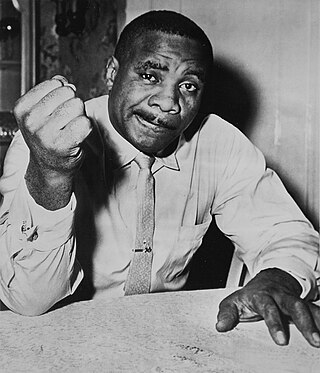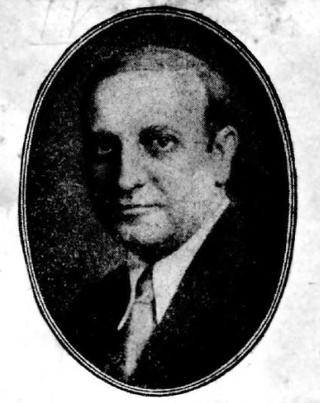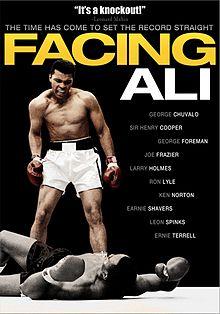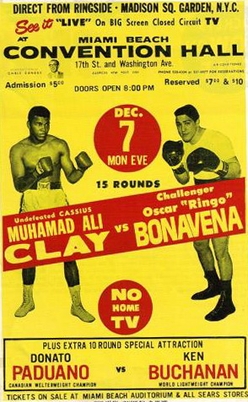
Muhammad Ali was an American professional boxer and activist. Nicknamed "the Greatest", he is regarded as one of the most significant sports figures of the 20th century and is often regarded as the greatest heavyweight boxer of all time. He held the Ring magazine heavyweight title from 1964 to 1970. He was the undisputed champion from 1974 to 1978 and the WBA and Ring heavyweight champion from 1978 to 1979. In 1999, he was named Sportsman of the Century by Sports Illustrated and the Sports Personality of the Century by the BBC.

Charles L. "Sonny" Liston, nicknamed "The Big Bear", was an American professional boxer who competed from 1953 to 1970. A dominant contender of his era, he became the undisputed world heavyweight champion in 1962 after knocking out Floyd Patterson in the first round, repeating the knockout the following year in defense of the title; in the latter fight he also became the inaugural WBC heavyweight champion. Often regarded as one of the greatest boxers of all time, Liston was particularly known for his immense strength, formidable jab, long reach, toughness, and is widely regarded as the most intimidating man in the history of combat sports.

Ali is a 2001 American biographical sports drama film co-written, produced and directed by Michael Mann. The film focuses on ten years in the life of the boxer Muhammad Ali, played by Will Smith, from 1964 to 1974, featuring his capture of the heavyweight title from Sonny Liston, his conversion to Islam, criticism of the Vietnam War, and banishment from boxing, his return to fight Joe Frazier in 1971, and, finally, his reclaiming the title from George Foreman in the Rumble in the Jungle fight of 1974. It also touches on the great social and political upheaval in the United States following the assassinations of Malcolm X and Martin Luther King Jr.

Angelo Dundee was an American boxing trainer and cornerman. Internationally known for his work with Muhammad Ali (1960–1981), he also worked with 15 other world boxing champions, including Sugar Ray Leonard, Sean Mannion, José Nápoles, George Foreman, George Scott, Jimmy Ellis, Carmen Basilio, Luis Manuel Rodríguez, and Willie Pastrano.

Nathaniel Stanley Fleischer was a noted American boxing writer and collector.

The two fights between Muhammad Ali and Sonny Liston for boxing's World Heavyweight Championship were among the most controversial fights in the sport's history. Sports Illustrated magazine named their first meeting, the Liston–Clay fight, as the fourth greatest sports moment of the twentieth century.

James Albert Ellis was an American professional boxer. He won the vacant WBA heavyweight title in 1968 by defeating Jerry Quarry, making one successful title defense in the same year against Floyd Patterson, before losing to Joe Frazier in 1970.
Fernando Pacheco Jimenez known publicly as Ferdie Pacheco, was the personal physician and cornerman for world heavyweight boxing champion Muhammad Ali as well as numerous other boxing champions. He was also a long-time boxing television commentator.

Facing Ali is a 2009 documentary directed by Pete McCormack about Muhammad Ali as told from the perspectives of ten opponents he faced during his career: George Chuvalo, Sir Henry Cooper, George Foreman, "Smokin'" Joe Frazier, Larry Holmes, Ron Lyle, Ken Norton, Earnie Shavers, Leon Spinks and Ernie Terrell.
King of the World is an American television film which aired on January 10, 2000, on ABC. It chronicles the early stages of the career of heavyweight boxer Muhammad Ali, who is portrayed by Terrence Howard. It is based upon a biography of the same name by David Remnick.

Muhammad Ali and Henry Cooper fought two boxing matches with each other in London. Their first match took place on 18 June 1963 and the second on 21 May 1966. Ali won both matches. The first fight was stopped by the referee in the fifth round, and the second in the sixth round. Both fights were stopped after Cooper started bleeding excessively from a cut to the left eye. The first Ali-Cooper bout is remembered for being one of the four fights in which Ali was officially knocked down in the ring by his boxing opponent, as well as leading to the mandate that ringside handlers always have an extra pair of boxing gloves available.

Muhammad Ali vs. Chuck Wepner was a professional boxing match contested on March 24, 1975, for the undisputed heavyweight championship.
Muhammad Ali vs. Earnie Shavers was a professional boxing match contested on September 29, 1977, for the undisputed heavyweight championship.
Cassius Clay and Archie Moore fought a boxing match on November 15, 1962, in Los Angeles. The fight is notable for being Clay's first professional fight in the modern heavyweight division, and featured two iconic fighters at different ends of their careers.
Muhammad Ali vs. Floyd Patterson was a professional boxing match contested on November 22, 1965, for the WBC, NYSAC and The Ring championship.

Muhammad Ali vs. Oscar Bonavena was a professional boxing match contested on December 7, 1970, for the NABF and Lineal heavyweight championship at Madison Square Garden in New York City on December 7, 1970.
Cassius Clay vs. Doug Jones was a professional boxing match contested on March 13, 1963. Clay won on points in what would prove to be one of the closest fights of his early professional career. The fight was named 1963's Fight of the Year by The Ring.
Cassius Clay fought Argentine Alex Miteff in a ten-round boxing match in Louisville on October 7, 1961. Clay won the fight through a technical knockout when the referee stopped the fight in the sixth round. Miteff and Clay would feature in the 1962 film Requiem for a Heavyweight.

Muhammad Ali was initially raised as a Baptist before his high-profile conversion to Islam. In the early 1960s, he began attending Nation of Islam Meetings. There, he met Malcolm X, who encouraged his involvement and became a highly influential mentor to Ali. Ali, who was named Cassius Clay after his father, first changed his name briefly to Cassius X and then finally to Muhammad Ali in 1964.

Muhammad Ali was a boxer who mastered the rope-a-dope fighting technique. He is widely regarded by many boxing commentators and historians as the greatest heavyweight boxer of all time. Boxing magazine The Ring named him number one in a 1998 ranking of greatest heavyweights from all eras. In 1999, The Associated Press voted Ali the number one heavyweight of the 20th century.













